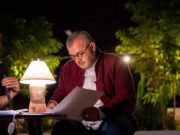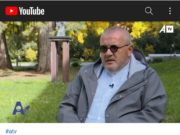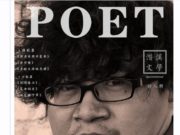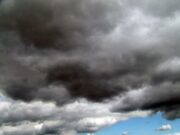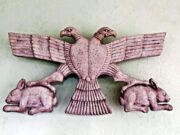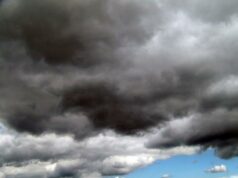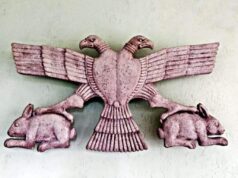Introductin by Idries Shah
ISF Publishing
The Idries Shah Foundation
P. O. Box 71911
London NW2 9QA
United Kingdom
Sanai and Sufism in the 20th Century West
David Pendlebury
The following is the text of an address delivered in Kabul,
Afghanistan, on October 22nd, 1977. The occasion was a seminar,
attended by more than ninety scholars and writers from fifteen
countries, to mark the 900th anniversary of the birth of the great
Sufi poet Hakim Sanai of Ghazna.
Apart from a few initial words of apology in Persian, and the
quotations from Hakim Sanai, the address was given in the
English language, followed by a summary in Persian by Dr. Abdul
Hakim Tabibi.
Appended to the text there is a brief discussion of the main
points raised both formally and informally by various participants
at the seminar.
It seems to me that the best way for me to begin would be to
explain briefly how I come to be taking part in this seminar.
The obvious answer is that certain gentlemen among you
were kind enough to invite me; but that again begs the
question „Why?‟ Because it has come to your attention that a
few years ago I wrote a short book – a very short book – on
the Hadiqa of Hakim Sanai.[1] Yes, but how did that come
about ?
In 1964 I read a book called The Sufis by Sayed Idries
Shah.[2] The very first words in this extraordinary book are a
quotation, in English, from Hakim Sanai‟s Hadiqat ul
Haqiqat, which I re-translate as follows:
All mankind is asleep
living in a desolate world;
the desire to transcend this
is mere habit and custom,
not religion – idle fairy tales.
Stop bragging in the presence
of men of the path:
better consume yourself
like burning chaff.
If you yourself
are upside down in reality,
then your wisdom and faith
are bound to be topsy-turvy.
Stop weaving a net about yourself;
burst like a lion from the cage.
These lines and the ensuing pages of Shah‟s book made
such an impression on me that I conceived a very strong
wish to become more closely associated with this man and
his work, and eventually opportunities began to present
themselves. One avenue of approach seemed to be to try and
follow the innumerable „leads‟ which he indicated in The
Sufis and in his brief but invaluable sequel to that book,
Special Problems in the Study of Sufi Ideas.[3] From the latter I
discovered that there existed an English translation of part of
Sanai‟s Hadiqa and this I was eventually able to obtain.[4] I
have already described my subsequent adventures with it in
some detail in my own little book, so I shall not go into them
here; however, I should like to amplify in this gathering how
great was the encouragement I received from Idries Shah
during the first embryonic stages of the book‟s existence.
When your invitation came I was of course highly
flattered; but my first reaction was to refuse. The last thing I
would claim to be is an orientalist, or any kind of scholar for
that matter; and as for being a Sufi, however much I may
sometimes wish I were one, reading a few lines of the
Hadiqa is quite enough to remind me that I am not. So at
first I was going to refuse, as I sensed that in more ways than
one I should be out of my depth.
But on the other hand I do share with you a deep affection
for the poet Hakim Sanai Ghaznawi, and to be able to pay
homage to him in this way on the occasion of his 900th
anniversary seemed an opportunity too good to be missed,
especially as I am unlikely to be able to attend his thousandth
anniversary. In the midst of these hesitations I got in touch
with Idries Shah, and once again his encouragement gave
further weight to my decision to come.
And so three factors seem to have brought me here:
yourselves, Hakim Sanai and Idries Shah.
I wish it were Shah, and not myself, talking to you now
and commemorating with you the monumental work of
Hakim Sanai of Ghazna; for if I am neither scholar nor Sufi,
he for his part is an almost unique blend of the two.[5] For
those who know him, he is the living proof that the spirit
which inspired Sanai is as active today as it was nine
centuries ago; and in times as confused as these, that is
surely cause for rejoicing.
But let me quote the first couplet translated in my little
book, so that there can be no misunderstanding about what it
is that is here being praised.
The seeing soul perceives
the folly of praising
other than the creator.
It is not the man, be it Sanai or Shah, but the creative spirit
visible in their work that we are celebrating here.
This current seminar, as far as its outward conception
goes, seems to be focusing on Hakim Sanai primarily as an
Afghan phenomenon, as possibly the greatest poet
Afghanistan has ever known. This is thoroughly
understandable and laudable; every country should be justly
proud of its poets and philosophers, especially when they
attain the eminence of Hakim Sanai. But, obviously, for an
outsider, however well-disposed he may feel towards
Afghanistan and the Afghans, this is unlikely to be central in
his motivation to study Hakim Sanai. As I see it, Hakim‟s
legacy is and should be for the whole of humanity, regardless
of national groupings, or even religious groupings for that
matter.
One of the amicable background disputes in which I have
been involved at this seminar has been the question of
whether or not Sufism is the sole prerogative of Islam. For
my part I cannot accept that Islam, in the sense of an
organized body of dogma and practices, has any exclusive
property rights over the manifestations of Sufism; though, of
course, in the basic sense of Islam as „surrender to God‟ it
may be regarded as identical with Sufism, as indeed may
certain aspects of Christianity. For me Tasawwuf, „the creed
of love‟, is above and beyond any particular religious
formulation and in case this notion should appear like a
heretical innovation to you, let me remind you that Hakim
Sanai was already saying something of the sort more than
eight hundred years ago:
At His door, what is the difference
between Moslem and Christian,
virtuous and guilty?
At his door all are seekers
and He the sought.
It is true that during the past ten centuries Sufism has
flourished visibly, and to an unprecedented degree within the
bosom of the Islamic culture: but that in itself does not
indicate to me, as it does to some of my colleagues here, that
Sufism and the Islamic faith are inextricably intertwined. I
can perfectly well imagine genuine Sufi activity taking root
in non-Moslem countries, such as the one I myself come
from. And I am not thinking of some kind of arbitrary
grafting of exotic Eastern practices (like the whirling
Dervishes of Baron‟s Court) but of a thoroughly indigenous
phenomenon, specifically created to take into account the
strengths and weaknesses of the prevalent culture.
I say I can imagine it; but that is being less than honest: I
have seen such a thing with my own eyes. To be true it is
still in its infancy, and there are plenty of teething troubles;
but I venture to state here that in the West a widespread
community of people from all walks of life are slowly and
methodically preparing themselves for the Sufi undertaking:
the conscious evolution of humanity.
That sounds terribly dramatic: the day-to-day reality is
much humbler; it is largely a matter of carrying on doing
what one did before, perhaps a little more conscientiously,
until the conditions of „time, place and people (zaman,
makan, ikhwan)’ are exactly right for a step forward. The
people I have in mind are familiar, to an extent that might
surprise a number of my colleagues here, with the ideas of
the great classical Sufis of the East, such as Sanai, Mevlana,
Attar, etc., and many other lesser-known figures besides
them; and I am sure they would wish me to say ‘Ishq!’ to all
of you gathered here who are students of these and other
great men of the past. But you are not likely to find them
rushing round Afghanistan in a frantic search for Khanaqas,
Pirs, Sheikhs and Wazifas – not because they do not respect
these things, but because they realize that any improvement
in their situation can only come from grappling with it on the
spot, not from running away from it to some totally alien
situation.
When I was working in Afghanistan about four years ago,
it used to sadden me to watch the thousands of young
„world-travellers‟ and „hippies‟ who came pouring through
usually on their way to India in search of DEEP
KNOWLEDGE. It always reminded me of that famous
Mulla Nasrudin story in which he loses his key, in the
darkness of his own house, but insists on looking for it
outside, „Because‟, he says, „there is more light there‟. Sanai
makes the same point:
Why don‟t you seek what you lost
where you lost it?
Over the past decades an intellectual and social climate has
come into being in the West in which it is at last possible for
the Sufi ideas of Sanai and other great teachers of the past to
form the fulcrum for an entirely new movement in human
history. Such ideas are no longer merely in the possession of
a handful of scholars and travellers, but are rapidly becoming
available to an ever-widening circle of informed people in
every walk of life. Such ideas are no longer an exotic
curiosity, a rare delicacy from distant places and distant
times: they are weaving themselves into the very fabric of
Western culture.
The mental framework of the society in which Sanai lived
and wrote was essentially religious, and very strictly so. The
mental framework of Western thought, as we all know, is a
scientific and technological one. And yet such an intellectual
climate stands just as much in need, as did the dogmatically
religious one of Sanai‟s day, of the subtle, many-sided and
many-levelled insights which are perhaps the most
immediately obvious spin-off of Sufic activity.[6] There are
abundant signs that this process of refinement is already
making itself felt in the West, and not a moment too soon,
when we consider the almost insoluble problems now
confronting the world as a result of the somewhat insensitive
application of technology in the past hundred years or so.
If there is to be any improvement in the general condition
of mankind, two factors seem to me to be of essential
importance, and both of these happen to be of a
psychological nature. Firstly, there must be a ruthlessly
realistic understanding of what man is and what his situation
is. Practically all our problems in this world arise out of
misconceptions concerning our own and other‟s natures.
Secondly, there must be a realistic, credible vision of a better
state of affairs for mankind, lest the very realization of our
grim situation should drive us all to despair. Nowhere have I
found these factors more clearly and forcefully expressed
than in Hakim Sanai‟s Hadiqa; and it was for that reason that
I attempted to convey something of what I had found there to
fellow English-speakers. It is for that reason, too, that I am
happy to be able to express my gratitude to this great human
being on the occasion of the 900th anniversary of his birth.
POSTSCRIPT
Owing to shortage of time, and other pressures, it was not
possible at the seminar to discuss fully a number of points
arising out of the above address. For the record I should like
briefly to mention the most important of these now.
By far the most controversial aspect of the talk seemed to
be the assertion that Sufism was not confined solely to the
Islamic Religion. Practically the whole of the brief question
period was given over to this point. Two closely related
questions emerged:
(1) Please explain on what Sufism (Tasawwuf) is based, if it
is not based on the Religion of Islam, as formulated in the
Qur’an.
(2) In the minds of millions of Moslems, Sufism (Tasawwuf)
is identified with a very specific form of activity within
Islam: is it not then perverse to identify it with something
else, which historically and geographically extends beyond
the scope of Islam?
Although these questions are dealt with in the above text,
further clarification might be useful. Nothing could be
further from my intention than to belittle Islam, which in its
essential conception I regard as the highest and purest form
of religion the world has yet seen – and is ever likely to see,
for that matter. But the evidence of Sufi activity both prior to
the foundation of Islam and extending far beyond the sphere
of Islamic influence is so abundant and widespread (see
Shah, op. cit.), that it is impossible to regard Islam and
Sufism as coterminous.
The assumption that Sufism is „based‟ on something, for
instance a religion, is in my view an inversion of the real
situation. It is not that Sufism is based on Islam, or any other
religion: it is much more a case of these religions
demonstrably being based on a common source: Sufism. As
for what the foundation of the latter might be, that is a very
large and daunting topic. Any brief and provincial answer
one might attempt inevitably has about it the dissatisfying
ring of a truism, cliche or half-truth. One might call the basis
of Sufism „love‟, „conscience‟, „the evolution of humanity‟,
etc., etc.; but by themselves these are simply words.
As for the second question, there does not seem to be
anything perverse in attempting to apply to a 20th century
Western context the vast resources of wisdom and
knowledge accumulated by Sufis in other places and times.
Indeed there would be something perverse about not trying
to make use of such resources, once one had stumbled across
them.
But why call it Sufism? Why not call it something else? It
is indeed unfortunate, but perhaps it cannot be helped, that
people‟s notions of what Sufism is and can be, so easily
degenerate into a sort of parochial totem pole. Sufism is
always „something else‟, and the wonder of it is that it is
always the same. The question arises out of the old confusion
between the contents and the container. It is rather like being
told that what I am drinking is not wine because I am
drinking it out of a disposable paper cup instead of a
corroded old brass goblet.
We call it Sufism because that is exactly what it is: a work
taken up in accordance with the needs of the present, but
entirely in the spirit of the great Sufis of all times, using the
knowledge, techniques, materials – and dare I say the
Baraka? – bequeathed by them to humanity.
REFERENCES
1. Hakim Sanai, The Walled Garden of Truth, an abridged
translation by D. L. Pendlebury. London 1974; New York
1976.
2. Idries Shah, The Sufis, London and New York 1964.
3. Idries Shah, Special Problems in the Study of Sufi Ideas,
London 1965. The text of a lecture delivered at the
University of Sussex, this paper is now incorporated as a
chapter in Shah‟s The Way of the Sufi, London 1968.
4. Hakim Sanai, The First Book of the Hadiqat ul Haqiqat,
edited and translated by Major J. Stephenson, Calcutta
1910.
5.i. Sufi Studies East and West, Ed. L. Rushbrook Williams,
New York 1973.
ii. Akhmet Azimovitch, „Idries Shah in Modern Science‟,
The Voice of Islam, Vol. XXI. No. 9, Karachi.
6. Among others, the work of Ornstein in the U.S.A. and de
Bono in the U.K. come immediately to mind; but a
comprehensive list of people in the West whose work has
been significantly influenced by Sufi ideas would be
exceedingly voluminous and quite beyond the scope of
this paper.
ABU AL-HASAN and ABU JA‟AFAR the Leper*
I had been many times to Meccah (Allah increase its
honour!) and the folk used to follow me for my knowledge
of the road and remembrance of the water-stations. It
happened one year that I was minded to make the pilgrimage
to the Holy House and visitation of the tomb of His Prophet
(on whom be blessing and the Peace!), and I said in myself,
„I well know the way and will fare alone‟. So I set out and
journeyed till I came to Al-Kadisiyah** and entering the
mosque there, saw a man suffering from black leprosy seated
in the prayer-niche. Quoth he on seeing me, „O Abu alHasan,
I crave thy company to Meccah‟. Quoth I to myself,
„I fled from all my companions, and how shall I company
with lepers?‟ So I said to him, „I will bear no man company‟;
and he was silent at my words. Next day I walked on alone,
till I came to Al-Akabah,*** where I entered the mosque and
found the leper seated in the prayer-niche. So I said to
myself, „Glory be to Allah! how hath this fellow preceded
me hither?‟ But he raised his head to me and said with a
smile, „O Abu al-Hasan, He doth for the weak that which
surpriseth the strong!‟ I passed that night confounded at what
I had seen; and, as soon as morning dawned, set out again by
myself; but when I came to Arafat† and entered the mosque,
behold! there was the leper seated in the niche! So I threw
myself upon him and kissing his feet said, „O my lord, I
crave thy company‟. But he answered, „This may in no way
be‟. Then I began weeping and wailing at the loss of his
converse, when he said, „Spare thy tears which will avail
thee naught!‟ – And Shahrazad perceived the dawn of day
and ceased to say her permitted say.
[*Arabs note two kinds of leprosy, „Bahak‟ or „Baras‟, the common or
white, and „Jusam‟, the black leprosy, the leprosy of the joints, mal
rouge. Both are attributed to undue diet as eating fish and drinking milk;
and both are treated with tonics, especially arsenic. Leprosy is regarded
by Moslems as a Scriptural malady on account of its prevalence amongst
the Israelites, who, as Manetho tells us, were expelled from Egypt
because they infected and polluted the population. In mediaeval
Christendom an idea prevailed that the Saviour was a leper; hence the
term „morbus sacer‟; the honours paid to the sufferers by certain Saints
and the Papal address (Clement III, A.D. 1189) dilectis filiis leprosis.
(Farrar‟s Life of Christ, i. 149.)
**A city in Irak; famous for the three days‟ battle which caused the death
of Yezdegird, last Sassanian king.
***A mountain pass near Meccah famous for the „First Fealty of the
Steep‟ (Pilgrimage, ii. 126). The mosque was built to commemorate the
event.]
[†To my surprise I read in Mr. Redhouse‟s „Mesnevi‟ (Trübner, 1881):
„Arafat, the mount where the victims are slaughtered by the pilgrims‟, (p.
60) This ignorance is phenomenal. Did Mr. Redhouse never read
Burckhardt or Burton?]
Now when it was the Four Hundred and Eighty-second
Night, She said, It hath reached me, O auspicious King, that
Abu al-Hasan continued:– Now when I saw the leper man
seated in the prayer-niche, I threw myself upon him and said,
„O my lord, I crave thy company‟; and fell to kissing his feet.
But he answered, „This may in no way be!‟ Then I began
weeping and wailing at the loss of his company when he
said, „Spare thy tears which will avail thee naught!‟ and he
recited these couplets:
Why dost thou weep when I depart and thou didst parting
claim;* And cravest union when we ne‟ever shall reunite
the same?
Thou lookest on nothing save my weakness and disease;*
And saidst, „Nor goes nor comes, or night or day, this
sickly frame‟.
Seest not how Allah (glorified His glory ever be!)* Deigneth
to grant His slave‟s petition wherewithal he came.
If I, to eyes of men be that and only that they see,* And this
my body show itself so full of grief and grame,
And I have naught of food that shall supply me to the place*
Where crowds unto my Lord resort impelled by single
aim,
I have a high Creating Lord whose mercies aye are hid;* A
Lord who hath none equal and no fear is known to Him.
So fare thee safe and leave me lone in strangerhood to woe*
For He, the only One, consoles my loneliness so lone.
Accordingly, I left him; but every station I came to, I found
he had foregone me, till I reached Al-Madinah, where I lost
sight of him and could hear no tidings of him. Here I met
Abu Yazid al-Bustami and Abu Bakr al-Shibli and a number
of other Shaykhs and learned men, to whom with many
complaints I told my case, and they said, „Heaven forbid that
thou shouldst gain his company after this! He was Abu
Ja‟afar the leper, in whose name folk at all times pray for
rain and by whose blessing-prayers their end attain‟. When I
heard their words, my desire for his company redoubled and
I implored the Almighty to reunite me with him. Whilst I
was standing on Arafat,† one pulled me from behind, so I
turned and behold, it was my man. At this sight I cried out
with a loud cry and fell down in a fainting fit; but when I
came to myself he had disappeared from my sight. This
increased my yearning for him and the ceremonies were
tedious to me, and I prayed Almighty Allah to give me sight
of him; nor was it but a few days after, when lo! one pulled
me from behind, and I turned and it was he again. Thereupon
he said, „Come, I conjure thee and ask thy want of me‟. So I
begged him to pray for me three prayers; first, that Allah
would make me love poverty; secondly, that I might never
lie down at night upon provision assured to me; and thirdly,
that He would vouchsafe me to look upon His bountiful
Face. So he prayed for me as I wished, and departed from
me. And indeed Allah hath granted me what the devotee
asked in prayer; to begin with He hath made me so love
poverty that, by the Almighty! there is naught in the world
dearer to me than it, and secondly since such a year, I have
never laid down to sleep upon assured provision; withal hath
He never let me lack aught. As for the third prayer, I trust
that He will vouchsafe me that also, even as He hath granted
the two precedent, for right Bountiful and Beneficent is His
Godhead, and Allah have mercy on him who said:*
Garb of Fakir, renouncement, lowliness;
His robe of tatters and of rags his dress;
And pallor ornamenting brow as though
„Twere wanness such as waning crescents show.
Wasted him prayer a-through the long-lived night,
And flooding tears ne‟er cease to dim his sight.
Memory of Him shall cheer his lonely room;
Th‟ Almighty nearest is in nightly gloom.
The Refuge helpeth such Fakir in need;
Help e‟en the cattle and the winged breed:
Allah for sake of him of wrath is fain,
And for the grace of him shall fall the rain;
And if he pray one day for plague to stay,
„Twill stay, and „bate man‟s wrong and tyrants slay.
While folk are sad, afflicted one and each,
He in his mercy‟s rich, the generous leach:
Bright shines his brow; as thou regard his face
Thy heart illumined shines by light of grace.
O thou who shunnest souls of worth innate,
Departs thee (woe to thee!) of sins the weight.
Thou thinkest to overtake them, while thou bearest
Follies, which slay thee whatso way thou farest,
Didst wot their worth thou hadst all honour showed,
And tears in streamlets from thine eyes had flowed.
To catarrh-troubled men flowers lack their smell;
And brokers ken for how much clothes can sell;
So haste and with thy Lord reunion sue,
And haply fate shall lend thee aidance due,
Rest from rejection and estrangement-stress,
And Joy thy wish and will shall choicely bless.
His court wide open for the suer is dight:–
One, very God, the Lord, th‟ Almighty might.



